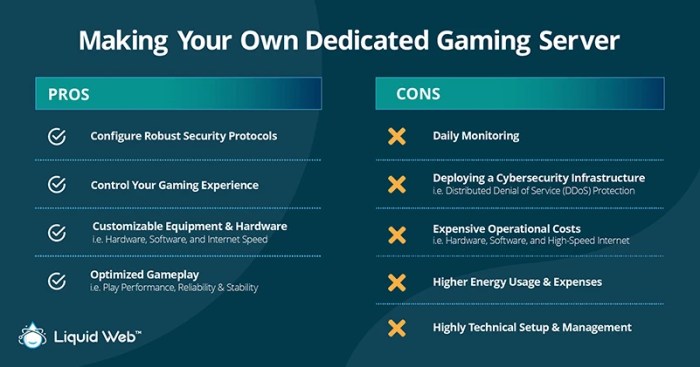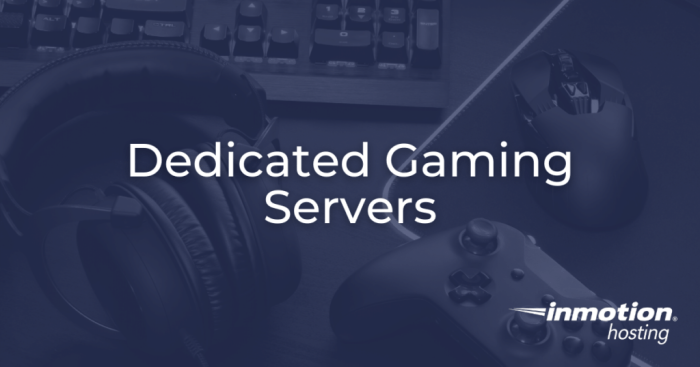In the realm of online gaming, building a dedicated game server is a crucial step towards delivering an immersive and seamless experience for players. Whether you’re an aspiring game developer or an experienced server administrator, this guide will provide you with the essential knowledge and best practices to establish a robust and reliable game server on a dedicated server.
This comprehensive guide will delve into the intricacies of planning and preparation, operating system and software setup, game server management, security and maintenance, and community and support. By the end of this journey, you’ll be equipped with the skills and knowledge to build and maintain a game server that meets the demands of your players and fosters a thriving gaming community.
Planning and Preparation
Advantages and Disadvantages
Building a game server on a dedicated server offers numerous advantages, including enhanced performance, greater control over hardware and software, and improved security. However, it also comes with potential drawbacks, such as higher upfront costs, ongoing maintenance responsibilities, and the need for specialized technical expertise.
Choosing the Right Hardware and Software
Selecting the appropriate hardware and software is crucial for a successful game server. Consider factors such as the number of players, game requirements, and budget. Choose high-quality components and reliable software that is optimized for gaming performance.
Secure and Reliable Network Infrastructure
Establish a secure and reliable network infrastructure to ensure smooth gameplay. Implement firewalls, intrusion detection systems, and regular security updates. Optimize network settings for low latency and high bandwidth to minimize lag and provide a responsive gaming experience.
Operating System and Software Setup

Choosing the right operating system and software is crucial for the performance and stability of your game server. Various operating systems are available, each with its advantages and disadvantages.
Choosing the Right Operating System
- Linux: Open-source, customizable, and widely used in server environments. Offers excellent performance and stability, but may require more technical expertise to configure.
- Windows Server: Commercial operating system known for its user-friendliness and wide software compatibility. However, it can be more expensive and less flexible than Linux.
- FreeBSD: Open-source operating system designed for high-performance servers. Provides a stable and secure platform, but has a smaller user base and fewer available software packages compared to Linux and Windows Server.
Installing and Configuring Software
Once you have chosen an operating system, you need to install and configure the necessary software for your game server. This typically includes:
- Game Server Software: The core software that runs your game. This varies depending on the game you are hosting.
- Web Server: Allows you to manage your game server remotely and provides access to player data and logs.
- Database: Stores player information, game settings, and other data.
- Firewall: Protects your game server from unauthorized access and malicious attacks.
Optimizing Performance
To ensure the best possible performance for your game server, consider the following tips:
- Use a Dedicated Server: A dedicated server provides exclusive resources for your game server, reducing latency and improving performance.
- Optimize Network Settings: Configure your network settings to minimize latency and packet loss. Consider using a content delivery network (CDN) to improve download speeds for players.
- Monitor and Tune: Regularly monitor your game server’s performance and adjust settings as needed to optimize performance. Use tools like Netstat and Wireshark to identify bottlenecks and improve efficiency.
Game Server Management
Managing a game server involves monitoring, troubleshooting, and scaling it to ensure smooth operation and meet player demand.
Remote Access and Automation
Remote access tools, such as SSH or RDP, allow you to manage your server from any location with an internet connection. Automation tools, like Ansible or Puppet, can streamline repetitive tasks, such as software updates or configuration changes.
Monitoring and Troubleshooting
Monitor key metrics, such as CPU and memory usage, to identify potential issues. Use logging and debugging tools to troubleshoot errors and resolve them quickly.
Scaling
As player demand increases, consider scaling your server by adding more resources, such as CPU cores or memory. This can be achieved through vertical scaling (upgrading existing hardware) or horizontal scaling (adding more servers).
Security and Maintenance

Protecting your game server from malicious attacks and ensuring its optimal performance are crucial aspects of maintaining a secure and enjoyable gaming experience.
Implement robust security measures to safeguard your server from unauthorized access, data breaches, and other threats. Regularly maintain your server to prevent downtime and ensure peak performance.
Security Measures
Implementing the following security measures is essential:
- Use a strong firewall to block unauthorized access.
- Configure secure passwords and enable two-factor authentication.
- Install and regularly update antivirus software.
- Monitor your server for suspicious activity and implement intrusion detection systems.
- Restrict access to sensitive data and limit user privileges.
Maintenance
Regular maintenance ensures your server runs smoothly:
- Apply software updates promptly to patch security vulnerabilities and improve performance.
- Monitor server performance metrics to identify potential issues and optimize resources.
- Create backups of your game data and server configuration to minimize data loss in case of emergencies.
- Test your server regularly to ensure it is functioning correctly and can handle peak loads.
- Consider using a dedicated monitoring tool to automate maintenance tasks and receive alerts.
Community and Support

Building a strong community around your game server is crucial for its success. It fosters a sense of belonging, encourages player interaction, and provides valuable feedback for game improvement.
To engage with your players, establish communication channels such as forums, Discord servers, and social media groups. Encourage regular discussions, host community events, and provide timely support. By actively listening to player feedback, you can identify areas for improvement and enhance the overall gaming experience.
Creating a Positive Gaming Environment
Creating a welcoming and respectful gaming environment is essential for a thriving community. Establish clear rules and guidelines to prevent toxic behavior, promote fair play, and encourage positive interactions. Encourage players to report any violations or concerns promptly, and take appropriate action to address them.
Last Word
Building a game server on a dedicated server is a rewarding endeavor that requires careful planning, technical expertise, and a passion for gaming. By following the principles Artikeld in this guide, you can create a game server that delivers an exceptional gaming experience, fosters a vibrant community, and stands the test of time.
Remember, the ultimate goal is to provide your players with an unforgettable gaming experience that keeps them coming back for more.
Helpful Answers
What are the advantages of using a dedicated server for game hosting?
Dedicated servers offer superior performance, reliability, and customization options compared to shared hosting environments. They provide exclusive access to hardware resources, allowing for optimized game performance and reduced latency.
What factors should be considered when choosing hardware for a game server?
Consider the number of players, game requirements, and desired performance level. Factors to evaluate include CPU cores, RAM capacity, storage space, and network connectivity.
How can I secure my game server from cyber threats?
Implement firewalls, intrusion detection systems, and regular security updates. Restrict access to sensitive data and monitor server activity for suspicious behavior.
What are best practices for optimizing game server performance?
Tune server settings, optimize network configuration, and regularly monitor performance metrics. Use caching mechanisms and consider load balancing to handle increased player demand.
How can I build a strong community around my game server?
Engage with players through forums, social media, and in-game events. Foster a welcoming and inclusive environment, and provide opportunities for players to connect and interact.


